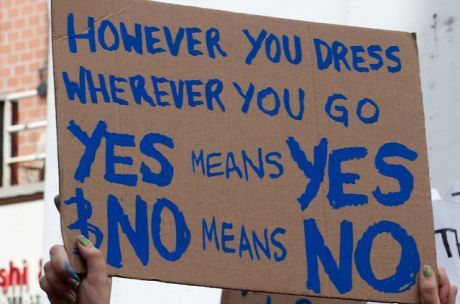Features
You are here
‘Yes means yes’ law challenges sexual assault on campus

October 25, 2014
There are crimes that are zealously prosecuted at great expense, even when there is no victim—like the “war on drugs” which has landed hundreds of thousands of Americans in prison for minor crimes, disproportionately people of colour. Then there are crimes with real victims that are often unreported for fear of the law—like sexual assault, disproportionately affecting women.
A report recently released by the White House Council on Women and Girls entitled, “Rape and Sexual Assault: A Renewed Call to Action” found that nearly one in five women, and one in 71 men have been raped or sexually assaulted in their lifetimes. Given the major problem of sexual assault on (and off) campus, and the threat of “men’s rights groups” that seek to downplay and justify it, California’s new law is a step forward.
In September, California became the first state to have “yes means yes” legislation. It passed a bill (Senate Bill 967) amending its Education Code to require all publicly funded colleges to adopt—in their relevant code of conduct policies dealing with sexual assault, stalking and dating and domestic violence—a heightened standard of affirmative consent for sex between students, on and off campus. The bill also reforms how investigations are to be conducted, and requires access to counseling and health services
Affirmative consent
The new California standard states “‘Affirmative consent’ means affirmative, conscious, and voluntary agreement to engage in sexual activity. It is the responsibility of each person involved in the sexual activity to ensure that he or she has the affirmative consent…Lack of protest or resistance does not mean consent, nor does silence…Affirmative consent must be ongoing throughout a sexual activity and can be revoked at any time…A dating relationship…or past sexual relations…should never by itself be assumed to be an indicator of consent.”
A simple “no” still means exactly that and is enough to negate consent, but now sexual activity will require a clear “affirmative consent” from both/all parties. Silence, lack of protest, or lack of resistance do not equate to consent. Nor can anyone give affirmative consent who is intoxicated by alcohol or drugs, under medication, asleep or unable due to a physical or mental condition. Any claimed consent under these circumstances could not have been conscious or voluntary, let alone affirmative. To avoid a charge of non-consensual sex, affirmative consent that is voluntary and conscious must be obtained and maintained through language and/or conduct for any sexual act. The new consent standard does not demand verbal permission—affirmative consent is to be determined based on the totality of the circumstances based on a preponderance (simple majority) of the evidence.
The new affirmative consent language gives California publicly-funded college/university administrators and investigators a new standard around which to frame questions for the parties (and witnesses) during investigations to determine if non-consensual sex occurred. The assailant will have the burden of showing why he thought he had the required consent for the specific sexual act in question.
Impact
So-called “men’s rights” groups are trying to build a base on campus by claiming to defend men who have been sexually assaulted. But if that were the case they should welcome legislation that seeks to protect all people from assault. But according to the “National Coalition for Men,” they “opposed ‘Yes means yes’ since we first heard of it…Initially NCFM was the only organization that submitted written opposition to SB 967.” Clearly “men’s rights” groups are more interested in protecting rape myths than victims of sexual assault. Opposition to the bill has also exposed right-wing “think tanks”, like the Reason Foundation, whose senior policy analyst Shikha Dalmia claimed that “women generally require more ‘convincing’” and that “sex is inherently dangerous.”
The affirmative consent requirement is needed and long overdue. Survey after survey has shown campus life is rife with sexual assault—with many women not reporting assaults due to fear, intimidation and uncertainty over whether a case can even be brought. Being afraid to say no or resist aggressive sexual advances will no longer will be a defense for assailants. The new standard will at least clarify this.
As Columbia University law professor Suzanne Goldberg explained, “It tells students very clearly that sex without consent is sexual assault.” Where there is uncertainty none may simply assume consent. Instead consent should be a sober communication that empowers women and prevents assault. As Savannah Badalich, a UCLA student and founder of 7,000 in solidarity (a campaign against sexual assault), explained, “It’s going to educate an entire new generation of students on what consent is and what consent is not…that the absence of a no is not a yes.”
The law itself won’t automatically prevent assault or stop sexual predators. But by helping debunk rape myths, expose the misogyny and hypocrisy of “men’s rights groups” and other peddlers of these myths, it helps women and their allies challenge rape culture on and off campus.
Section:
Topics:









